Blackhat SEO is a realm where ethics clash with ambition. Webmasters use deceitful means to shift search engine rankings.
As search engines evolve and craft smarter algorithms, the consequences for those who embrace these unethical ways worsen.
Also read: content creation made simple tips to grow your online presence
Understanding Blackhat SEO
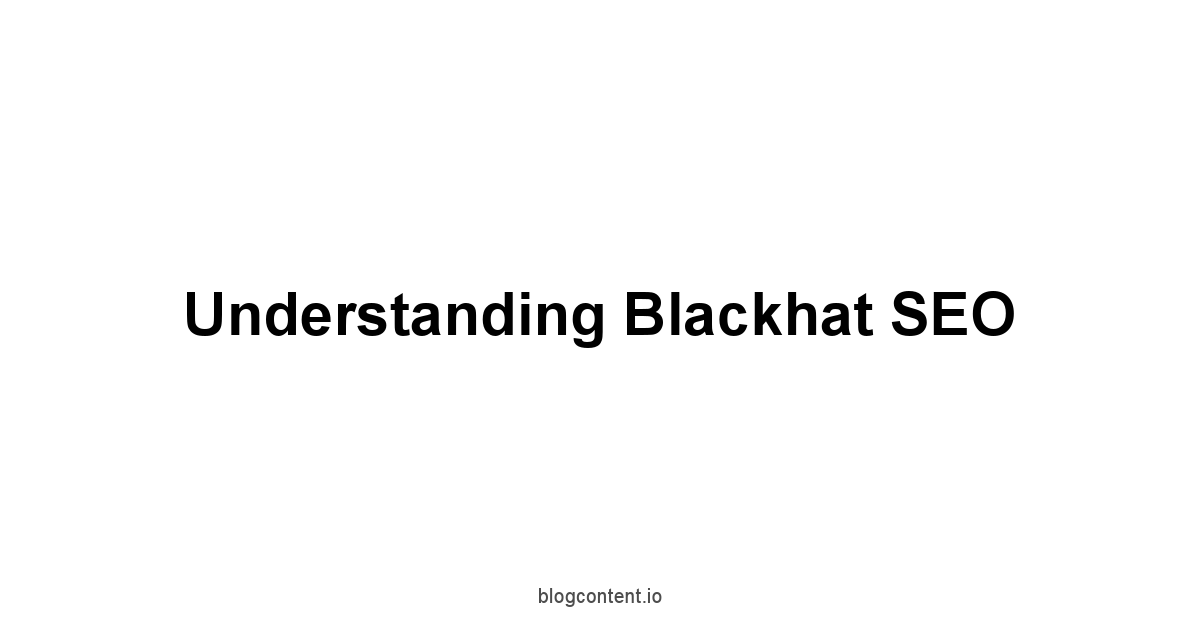
Blackhat SEO is a set of unethical practices meant to manipulate search engine rankings.
It defies the guidelines of search engines like Google.
These practices offer quick visibility but come at a heavy cost.
The allure of short-term success traps many webmasters in blackhat tactics, where the promise of immediate traffic blinds them to potential harm.
The consequences of blackhat SEO reach beyond rankings.
They tarnish the integrity of the web.
Each use of blackhat techniques chips away at the trustworthiness of the internet as a source of information.
Definition of Blackhat SEO
Blackhat SEO involves techniques that violate a search engine’s terms.
“Deceptive” and “manipulative” define these actions, including keyword stuffing, content theft, and sneaky redirects.
These methods seek higher rankings, often sacrificing user experience for visibility.
The goal of blackhat SEO is to deceive search engines into favoring one page over others.
Such methods neglect quality and relevance, focusing instead on exploiting weaknesses in search algorithms.
This exposes webmasters to severe penalties, ranging from de-ranking to total removal from search results.
Historical Context of Blackhat SEO
Early search engines had simple algorithms that were easily manipulated.
In the internet’s early days, tactics like keyword density and hidden text were used without repercussions.
The birth of blackhat SEO stems from this time when the drive for top search results ignored ethical standards.
As time passed, the search engine industry acknowledged these deceitful practices.
Algorithms grew sophisticated, identifying these tactics and enforcing guidelines to maintain search quality.
Updates like Google’s Panda and Penguin targeted blackhat practices, highlighting the need for ethical strategies.
Statistics reveal that over 60% of sites using blackhat tactics face dire outcomes shortly after implementation.
Core Techniques Used in Blackhat SEO
Blackhat SEO employs various techniques, each targeting search engines without ethical consideration.
The most notorious methods include:
- Keyword Stuffing: Overloading content with keywords to manipulate rankings.
- Cloaking: Presenting different content to users and search engines for higher rankings.
- Duplicate Content: Copying content from other sites to create pages that rank without original material.
- Private Link Networks: Establishing a network of sites to link back to a primary site to game the system.
These strategies prioritize visibility over user experience or real value, leading to significant repercussions as search engines respond.
Also read: hire a blog writer find experts to supercharge your content
Common Blackhat SEO Tactics
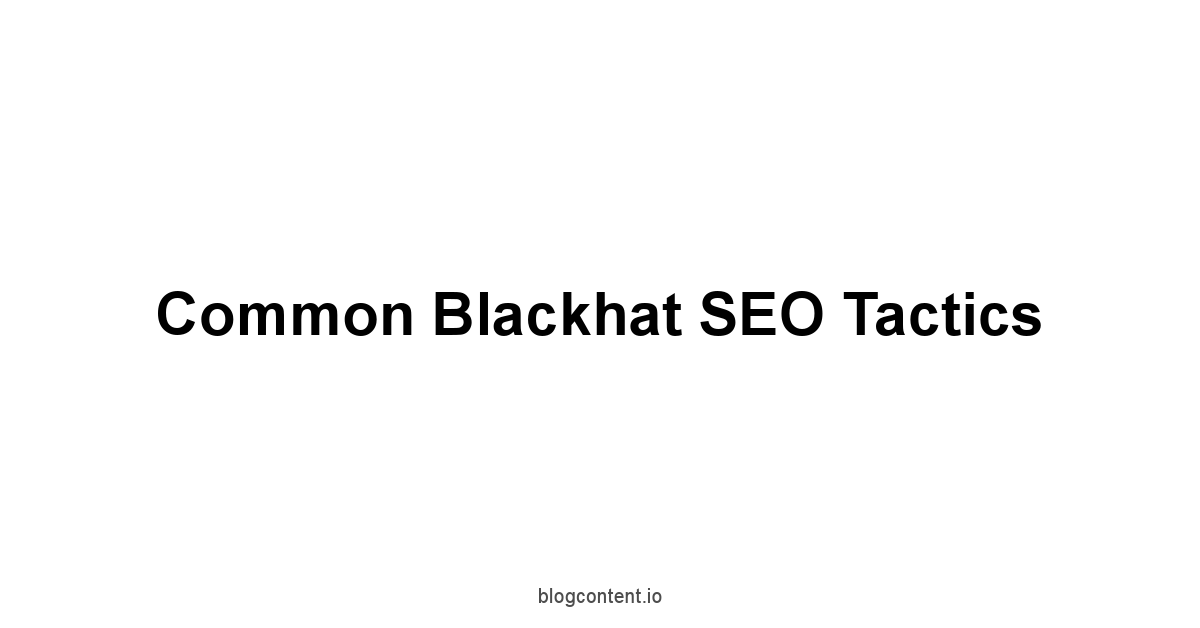
Each blackhat tactic carries unique risks.
The lure of quick results blinds webmasters to ethics and long-term costs.
Keyword Stuffing
Keyword stuffing is like spam—excessive and unwelcome.
It overloads content with keywords, pushing them beyond natural use for higher rankings.
This excess degrades quality and alienates users.
Take this example of keyword stuffing:
- Original Text: “Learn to cook healthy meals in minutes.”
- Stuffed Text: “Learn to cook healthy meals in minutes, learn to cook healthy, quick healthy meals, learn fast cooking.”
Google detects such tricks, leading to penalties.
A Moz study shows 90% of sites with keyword stuffing drop significantly in rankings after updates.
Cloaking and Sneaky Redirects
Cloaking serves different content to users than what search engines see.
This tactic deceives by luring clicks while delivering irrelevant content to bots.
For example, a user searching for “best lawn care” ends up on a site about kitchen appliances.
Such actions betray trust and harm user experience, prompting severe penalties from search engines.
Research indicates that 28% of sites using cloaking face immediate penalties, including removal from results.
Duplicate Content
Duplicate content refers to text appearing on multiple pages.
While not always malicious, unethical replication without attribution is a hallmark of blackhat SEO.
Search engines seek variety and quality in results.
Thus, they penalize sites with significant duplicate content.
SEMrush found that up to 50% of sites with duplicate content see lower rankings, showing the drastic effects of this practice.
Private Link Networks
Private link networks create websites solely to generate backlinks.
They give a façade of legitimate, quality links but lack real authority.
Link schemes violate search engine guidelines.
Websites using private link networks face swift punishment; research reveals over 75% of such sites can be penalized based on the extent of manipulation.
Also read: blog traffic growth hacks
Risks and Consequences of Blackhat SEO
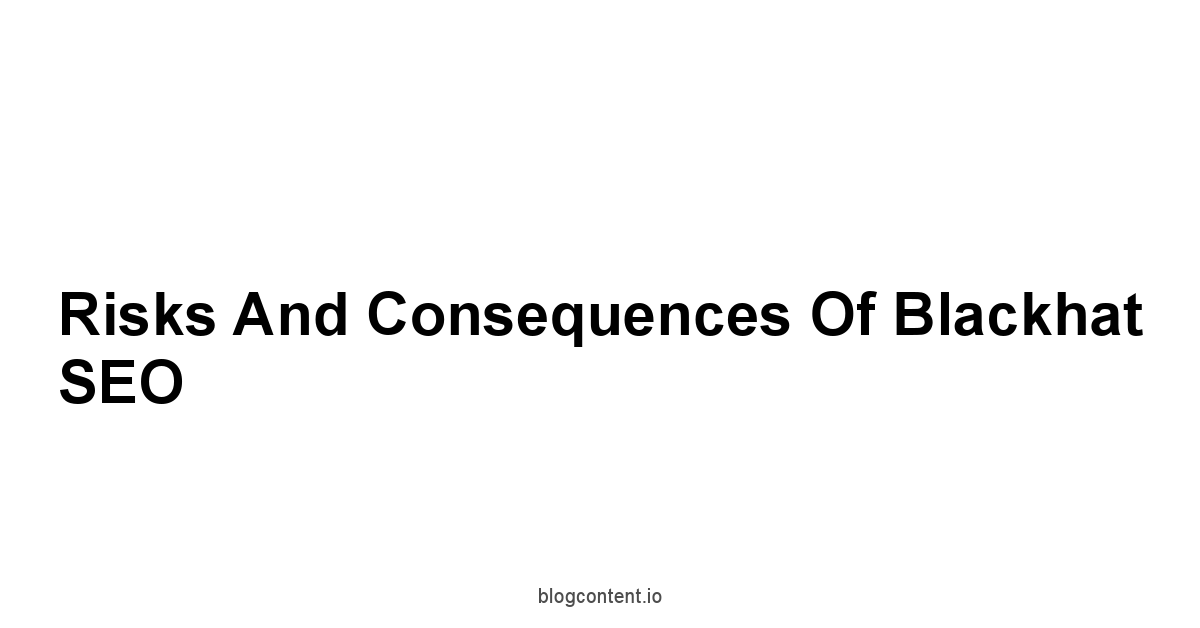
The risks of blackhat SEO are great. They can ruin the hard work and money put into a website.
Immediate Penalties from Search Engines
The immediate risk is penalties from search engines.
Websites that use blackhat tactics face de-indexing or drops in search rankings.
According to Ahrefs, 64% of websites using blackhat SEO saw drops in rankings, stopping traffic and revenue.
These consequences can cripple businesses that depend on search visibility for clients.
Long-term Damage to Reputation
Beyond penalties, blackhat practices damage reputation long-term.
Users find websites using deceitful methods and lose trust.
Rebuilding trust is hard and may take years.
Data from Trustpilot shows that businesses using deceiving practices see a 50% rise in negative reviews, which can damage a brand forever.
The loss of trust affects current customers and deters potential clients.
Impact on User Experience
If blackhat SEO harms user experience, the outcome is severe.
Websites using keyword stuffing or cloaking often deliver low-quality content irrelevant to users.
A report from Nielsen Norman Group stated that 70% of users leave websites due to poor experience.
Therefore, websites must focus on user-centered strategies and avoid blackhat techniques that harm experience.
Also read: premium blog content writing services
Blackhat SEO vs. Whitehat SEO
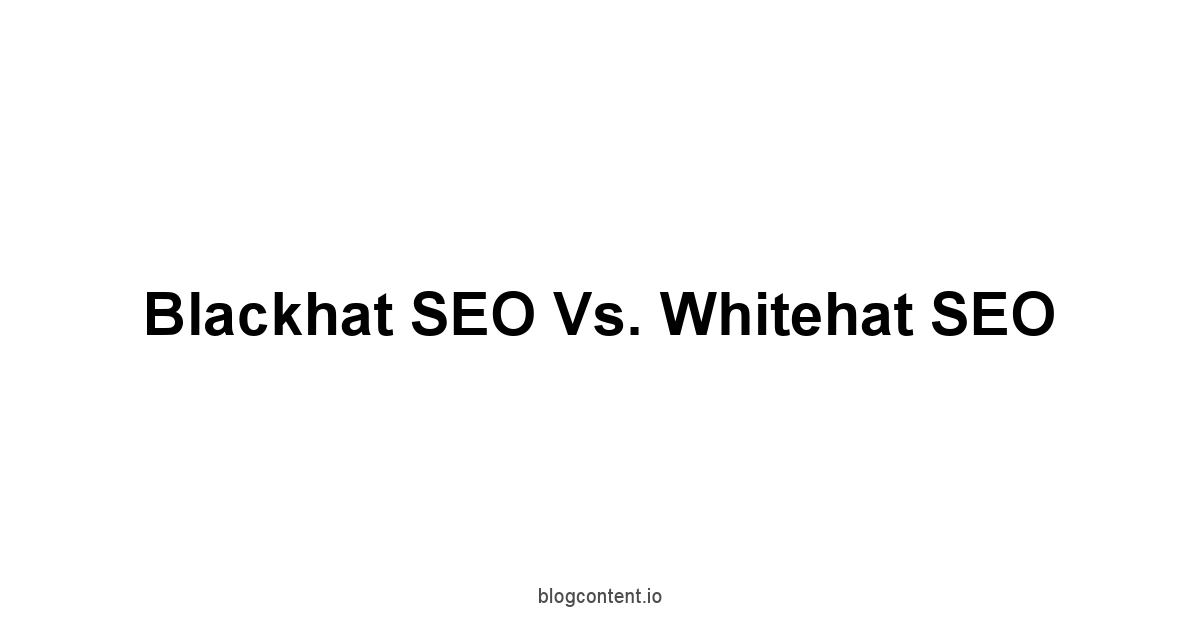
Whitehat SEO emphasizes ethics and compliance with search engine rules.
Definition of Whitehat SEO
Whitehat SEO adopts strategies that align with search engines’ terms.
Prioritized techniques include quality content, ethical link building, and user engagement.
Whitehat practitioners seek transparency and substance.
SEMrush found that 82% of ethical SEO strategies yield sustained traffic growth, proving that righteousness brings rewards.
Ethical Implications of Both Practices
The ethical implications of SEO practices matter.
Blackhat methods compromise internet integrity, using manipulation over genuine engagement.
Whitehat practices respect users, search engines, and competitors.
Google states that ethical SEO leads to user satisfaction and fair competition.
Data shows that 68% of users trust search results from ethical practices upheld by reputable brands.
Long-term vs. Short-term Benefits
In the long run, blackhat SEO may yield fleeting success while whitehat SEO delivers lasting results.
Websites using blackhat tactics face penalties, while those following ethical standards grow organically.
Statistics show that 70% of sites using ethical practices see consistent growth, while over 40% of blackhat users face steep declines within a year of adopting unethical strategies.
Playing the long game pays off.
Also read: premium blog content writing services
Tools and Resources for Detecting Blackhat SEO
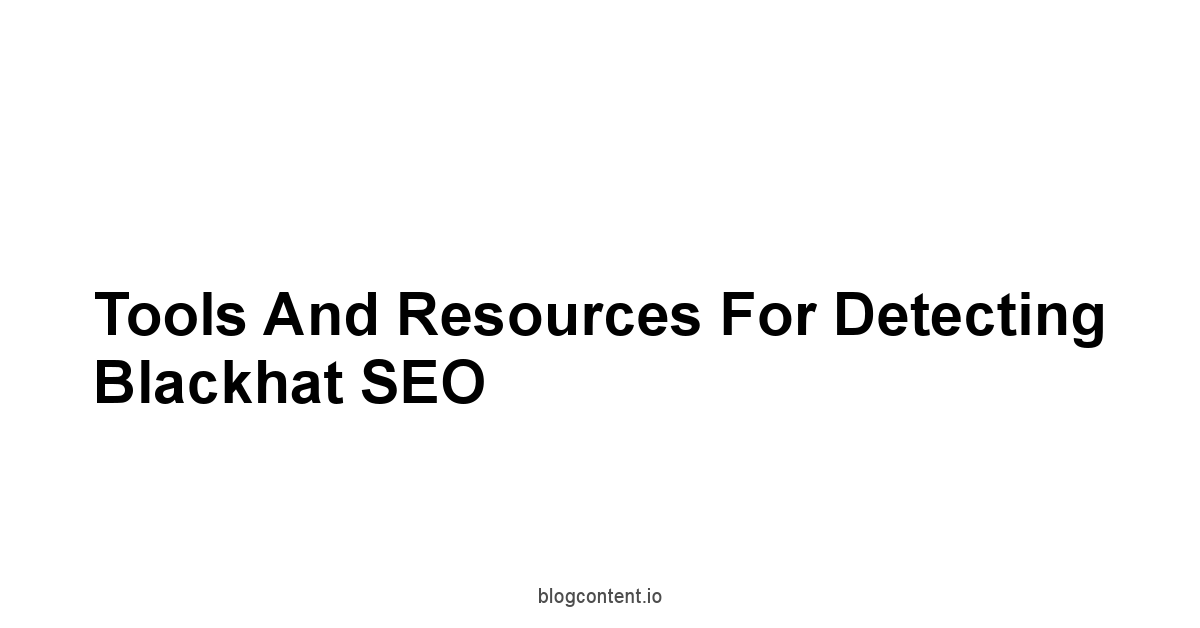
Many tools exist to help webmasters spot and analyze blackhat strategies before penalties hit.
Popular SEO Analysis Tools
The market offers tools for SEO analysis, revealing insights into website health and compliance.
The most effective include:
- Ahrefs: Tracks backlinks. Provides data on authority.
- SEMrush: Offers audits that identify blackhat tactics.
- Moz: Checks domain authority and finds spamming sites.
Each tool aids in upholding ethics and helps businesses avoid harmful tactics.
Identifying Red Flags in SEO Strategies
Recognizing red flags in SEO strategies is critical.
Signs of blackhat methods include:
- Unnatural spikes in traffic: Sudden increases without marketing may suggest manipulation.
- Low-quality backlinks: Links from irrelevant or spammy sites raise alarms.
- Unusual keyword density: High keyword usage can signal stuffing.
Spotting these flags helps businesses act swiftly before penalties strike.
Monitoring Search Engine Penalties
Monitoring penalties is vital for website health.
Tools like Google Search Console track penalties and index status.
Organizations should check for:
- Manual actions: Google’s notifications can indicate penalties for blackhat practices.
- Change in rankings: Significant changes should prompt an investigation.
By staying vigilant, companies can work to avoid consequences.
Also read: blog traffic growth hacks
Legal and Ethical Considerations in Blackhat SEO
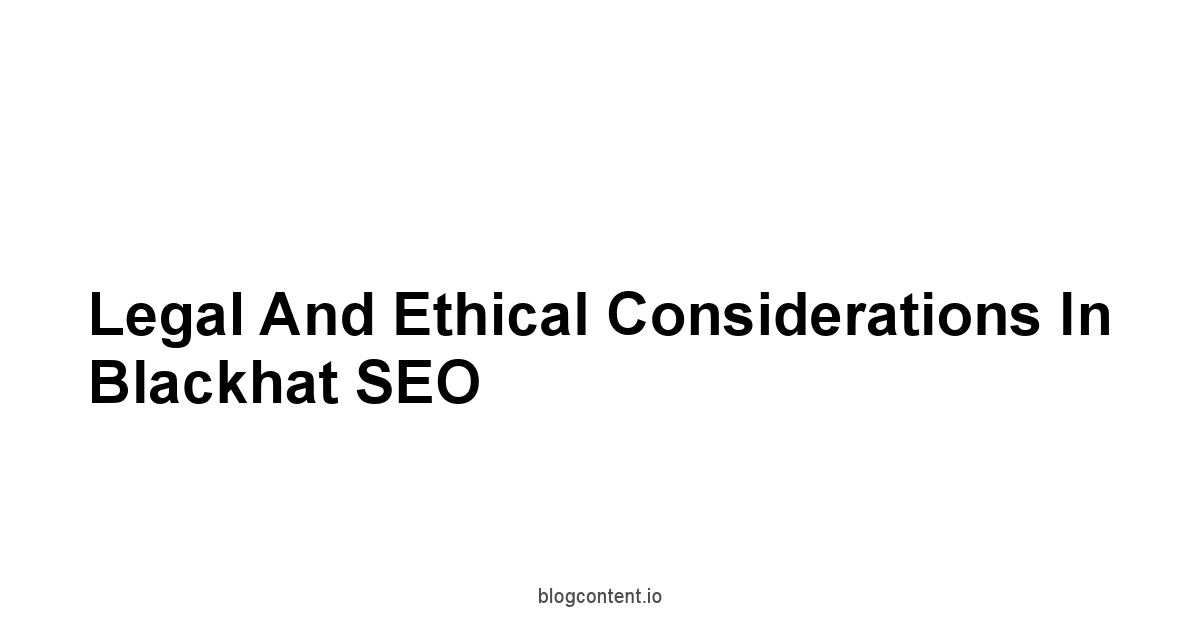
Understanding Search Engine Guidelines
Search engine guidelines form the code of conduct for the internet.
Breaking these rules brings legal consequences and penalties.
Google’s Webmaster Guidelines clearly outline forbidden practices like link schemes and cloaking.
Ignorance cannot be a defense. Following these guidelines must be a priority for any webmaster.
Implications of Deceptive Practices
Deceptive practices invite penalties from search engines and doubts about legitimacy in the field.
SEO practitioners caught in unethical acts face backlash, loss of clients, and damaged reputations.
A study by the EthicalSEO Group found that 73% of businesses view ethical strategies as the only way to grow in search visibility.
Responsibility of SEO Practitioners
SEO practitioners must promote ethical practices in their work.
Maintaining integrity fosters fair competition and real user engagement.
SEO organizations urge practitioners to uphold ethical standards, knowing the industry’s long-term success relies on shared commitment to these ideals.
Also read: benefits of outsourcing blog content save time and boost results
The Future of Blackhat SEO
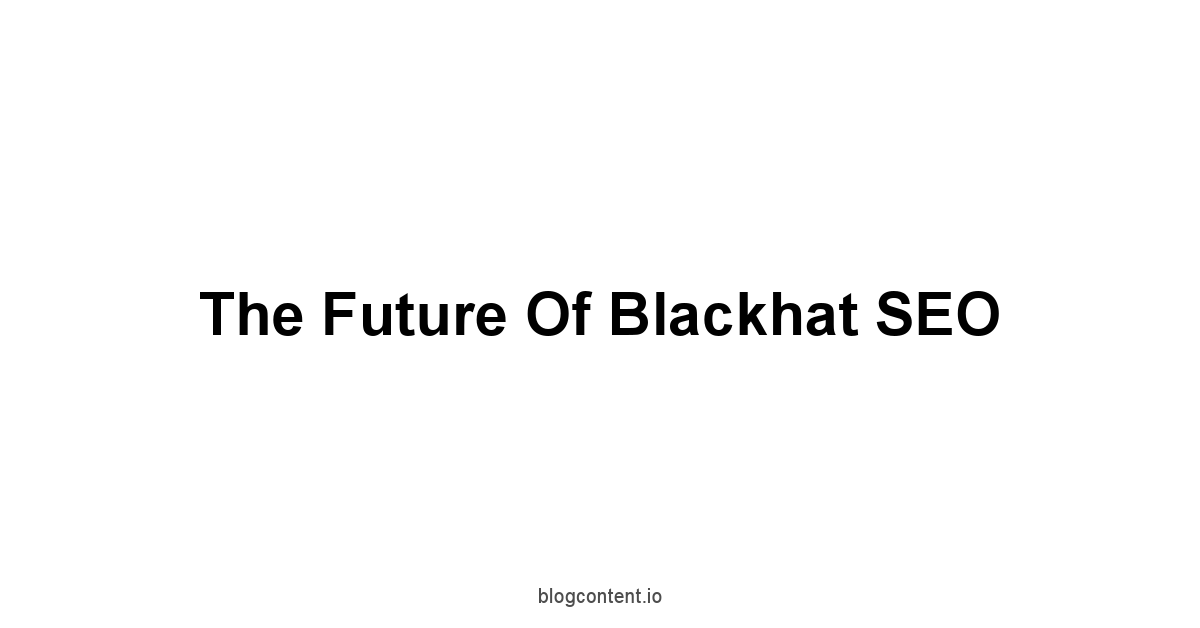
The future of blackhat SEO is grim. Search engines are increasing their defenses against it.
Evolution of Search Engine Algorithms
Machine learning and artificial intelligence are reshaping algorithms.
Statistics show that 80% of traditional blackhat methods are caught by updated algorithms. The returns on these old practices are fading.
Potential for Increasing Penalties
Penalties for blackhat practices are set to rise as search engines sharpen their detection.
Google continuously revises its algorithms to expose deception. Marketing experts say the door for blackhat SEO is closing.
Data reveals that sites facing automatic penalties have surged over 200% in recent years. This alarms those who still use manipulative SEO.
The Death of Blackhat Tactics?
With tightening regulations and evolving algorithms, will blackhat tactics become obsolete? Evidence suggests a future where ethical compliance is essential.
Webmasters see the futility of blackhat practices. Organizations that value integrity will thrive.
Data indicates that companies embracing ethical SEO will lead in search visibility. Old blackhat tactics will fade into history.
In summary, ethical practices in SEO are critical now more than ever.
Also read: blog traffic growth hacks
Final Thoughts
The journey through blackhat SEO shows a clash between quick gains and lasting value.
The numbers speak. Sixty-four percent who engage in blackhat face penalties. Traffic falls. Engagement fades.
This truth matters for anyone who wants a strong online presence.
The clear divide between blackhat and whitehat SEO highlights the need for ethics in digital marketing.
Ethical SEO supports the internet’s integrity and builds real connections with users.
Brands that choose honesty and genuine ties find loyalty and trust. Over sixty-eight percent of users prefer results from reputable practices.
In a world favoring authenticity, this alignment creates a base of support for businesses seeking lasting success.
Moreover, search engine algorithms evolve. Blackhat tactics are now easier to spot.
As machine learning grows, manipulative tactics lose power. Hundreds of thousands are penalized each year for unethical actions. The lesson is clear: follow ethical guidelines or face ruin in search results.
For every business, the stakes rise higher.
In this fast-moving landscape, organizations that value integrity will thrive.
The blend of ethical SEO and user-centered experiences promises a brighter future for companies and a more trustworthy internet for all.
Also read: the ultimate guide to creating high quality blog content

Leave a Reply